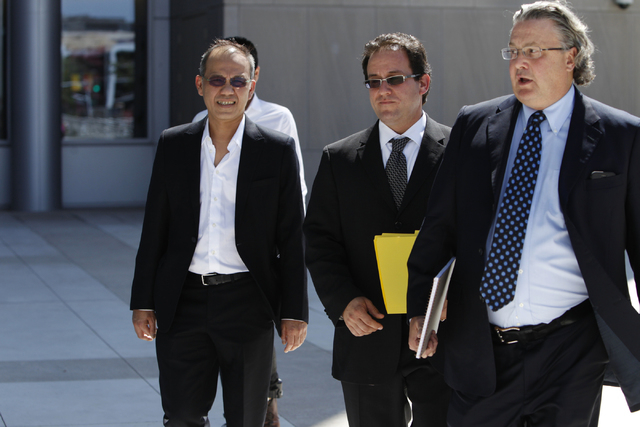Judge stands by order tossing most evidence in World Cup betting case
A federal judge on Thursday denied a request from prosecutors to reconsider his order tossing out the brunt of the evidence in the illegal gambling case against wealthy Malaysian businessman Paul Phua.
At a hearing earlier in the week, U.S. District Judge Andrew Gordon had thrown out the remaining evidence FBI agents seized from Caesars Palace villas during a July 9 FBI raid on what they alleged was a betting operation that accepted millions of dollars in illegal wagers on the World Cup soccer tournament.
Gordon said the evidence was the “fruit” of illegal FBI searches before the raid.
He chastised prosecutors at the two-hour hearing for not providing him with evidence to support their argument to keep the betting evidence in play.
Assistant U.S. Attorney’s Cristina Silva and Phillip Smith Jr. told Gordon they wanted to put an FBI agent on the witness stand, but the judge wouldn’t let them.
“The government respectfully submits that it is manifestly unjust for this court to grant the motion to suppress without an evidentiary hearing,” the prosecutors later said in court papers asking Gordon to take a second look at his decision.
But in a nine-page written order reaffirming his position Thursday, Gordon said prosecutors should have asked to present evidence in court long before this week’s hearing. He also said the FBI agent prosecutors wanted to testify was not intimately involved in the investigation of Phua and would not have figured in his decision.
Phua, 51, a Strip high roller and poker player worth hundreds of millions of dollars, was among eight defendants from Malaysia and China charged in the international betting scheme.
Six defendants, including Phua’s son Darren, pleaded guilty and were each fined and sentenced to five years of probation with the condition they stay out of the United States during that period. The case against a seventh defendant was dismissed.
Phua, who is facing conspiracy and illegal gambling charges, is supposed to stand trial June 15. In the wake of Gordon’s ruling, however, his attorneys are pressing the judge to allow him to return to Malaysia to see his ailing mother. They are hoping the government will move to dismiss the case.
Last month, Gordon ruled that FBI agents violated Phua’s privacy rights when they entered his Caesars Palace villa on July 9 posing as Internet repairmen to secretly gather evidence days before conducting the raid. He prohibited prosecutors from using any evidence agents obtained through the unprecedented ruse, which he said amounted to an illegal search.
Then, under the legal doctrine fruit of the poisonous tree, defense lawyers sought to bar prosecutors from using evidence seized from two other villas. One of the villas was alleged to have been operating as a boiler room betting operation with several computers and television monitors set up to handle the action.
Defense lawyers argued that without evidence obtained through the ruse, agents would not have had enough probable cause to persuade a judge to authorize search warrants.
Prosecutors contended that the government had plenty of evidence to justify a search of the villa set up with the electronic equipment.
Contact Jeff German at jgerman@reviewjournal.com or 702-380-8135. Find him on Twitter: @JGermanRJ

















